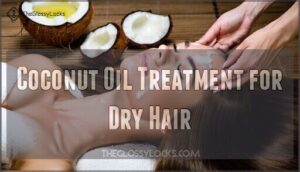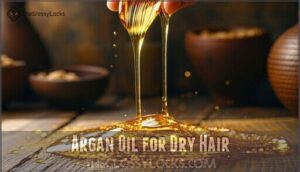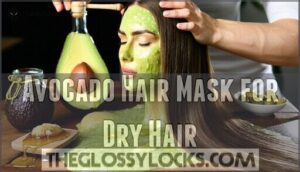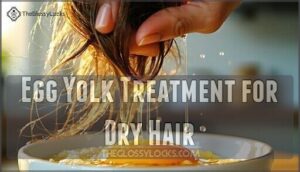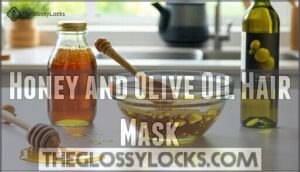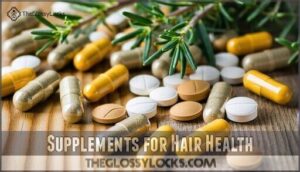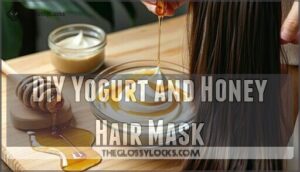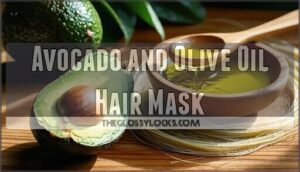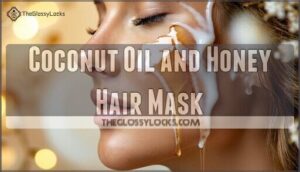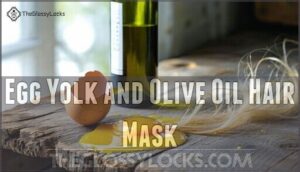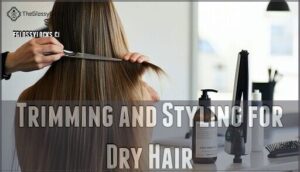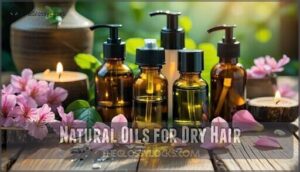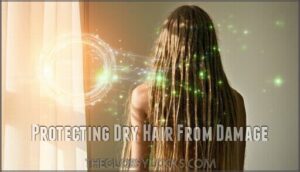This site is supported by our readers. We may earn a commission, at no cost to you, if you purchase through links.

Coconut oil provides deep moisture when applied as an overnight treatment, while avocado masks rich in healthy fats nourish damaged cuticles. Egg yolks contain proteins that strengthen hair structure, and honey acts as a natural humectant to lock in moisture.
Olive oil penetrates the hair shaft to repair damage from within. You’ll also want to reduce heat styling, wash less frequently, and protect your hair from environmental stressors.
These natural solutions work because they restore your hair’s natural lipid barrier. The key is understanding which remedies target your specific damage type and how to apply them correctly for maximum results, using ingredients like coconut oil and avocado masks to achieve healthy locks and deep moisture, and ultimately leading to natural solutions.
Table Of Contents
- Key Takeaways
- Causes of Dry Hair
- Washing and Conditioning Practices
- Natural Remedies for Dry Hair
- Diet for Healthy Hair
- Supplements for Hair Health
- Hair Masks for Dry Hair
- Trimming and Styling for Dry Hair
- Natural Oils for Dry Hair
- Protecting Dry Hair From Damage
- Maintaining Healthy Hair
- Frequently Asked Questions (FAQs)
- What is the best home remedy for dry damaged hair?
- How to quickly repair dry hair?
- How often should I apply natural oils to dry hair?
- Are there any home remedies for dry scalp treatment?
- Can I leave hair masks on dry hair overnight?
- How long does it take to repair severely dry hair?
- Can rice water treatments strengthen damaged hair?
- How often should homemade hair masks be used?
- Which essential oils work best for scalp health?
- Does apple cider vinegar really remove buildup?
- Conclusion
Key Takeaways
- Start with kitchen staples – You’ll repair dry hair using coconut oil, avocado, honey, and egg yolks that penetrate deeply to restore your hair’s natural moisture barrier and strengthen damaged strands.
- Change your washing habits – You should wash your hair every 2-3 days with sulfate-free shampoo, use lukewarm water, and always rinse with cool water to seal cuticles and lock in moisture.
- Apply treatments consistently – You’ll see real results in 6-12 weeks by using weekly deep conditioning masks and daily leave-in treatments, since damaged hair needs time to rebuild its protective layers.
- Protect while you repair – You must limit heat styling, trim every 6-8 weeks to prevent split ends from spreading, and use silk pillowcases to reduce overnight friction damage.
Causes of Dry Hair
Your hair becomes dry when daily habits strip away its natural protective oils, leaving strands brittle and lifeless.
Your daily habits are secretly sabotaging your hair’s natural moisture barrier, leaving strands parched and vulnerable.
Heat styling, harsh shampoos, poor nutrition, and environmental factors like sun exposure all contribute to this moisture loss that makes your hair look dull and feel rough, which is a result of daily habits.
Stripping of Natural Oils by Shampoo
When you shampoo frequently, you’re basically washing away your hair’s protective sebum layer, leaving strands parched and vulnerable. Sulfate-free formulas offer gentler cleansing without compromising natural hair hydration.
Consider these shampoo ingredients to avoid for effective dry hair repair:
- Sodium lauryl sulfate (strips natural oils aggressively)
- Ammonium laureth sulfate (causes scalp buildup)
- Parabens (disrupt moisture balance)
- Alcohols like isopropyl (extremely drying)
- Synthetic fragrances (irritate sensitive scalps)
Smart washing techniques and natural alternatives protect your hair’s oil replacement system.
Excessive Heat Styling
Bombarding your hair with scorching styling tools creates heat damage signs like brittleness and split ends.
Temperature control matters—keep tools under 300°F and always use heat protectants.
Styling tool types like blow dryers and flat irons strip moisture, making dry hair repair essential.
Try homemade hair masks for damaged hair repair and follow hair hydration tips with DIY hair remedies.
Lack of Essential Vitamins and Minerals
Your hair’s crying out for proper nutrition, and vitamin deficiencies might be sabotaging your strands from within.
Poor mineral absorption affects scalp health and weakens hair follicles, making dietary changes essential for effective hair nourishment.
- Vitamins A, C, and E deficiencies cause dullness and breakage
- Low iron levels slow growth and weaken follicles
- Insufficient minerals like zinc disrupt natural hair treatment processes, worsening hair damage
Poor Hair Care Practices
Your everyday habits can sabotage your hair’s health without you realizing it.
Rough combing tears strands, while tight hairstyles stress follicles and cause hair thinning.
Chemical overuse from frequent coloring strips natural oils, leading to hair frizz and split ends.
Infrequent trims allow damage to travel up the shaft.
Product buildup weighs down hair, blocking moisture absorption and creating hair damage that even the best hair masks can’t fully repair.
Environmental Factors
Mother Nature isn’t always kind to your locks.
Weather changes, seasonal impacts, and UV exposure can leave your hair parched and brittle. Water quality issues compound the problem, while pollution effects create a toxic cocktail for hair damage.
- UV exposure breaks down hair proteins, causing dryness and color fading
- Pollution effects coat strands with harmful particles that strip moisture
- Weather changes create humidity swings that disrupt your hair’s natural balance
Washing and Conditioning Practices
How you wash and condition your hair directly impacts its health and moisture levels.
Getting the basics right—from shampooing frequency to water temperature—can transform dry, brittle strands into soft, manageable hair, which is a complete concept that affects hair health.
Shampooing Frequency for Dry Hair
Overdoing it with shampoo strips your hair’s natural protective oils, leaving strands parched and brittle.
When dealing with dry hair, washing every 2-3 days works best—this gives your scalp time to produce those essential oils.
Pay attention to water temperature during hair washing; lukewarm beats scalding hot for preventing further moisture loss.
Between washes, dry shampoo alternatives can tackle scalp buildup without harsh shampoo ingredients, helping to prevent moisture loss.
Choosing The Right Shampoo for Dry Hair
Since choosing the right hair shampoo requires careful consideration, sulfate-free shampoos with pH balanced formulas protect your strands from harsh chemicals.
Look for moisturizing ingredients that treat dry scalp conditions while supporting natural hair care routines. Many consumers now seek gentle hair cleansers for healthier hair.
Key features for dry hair treatment:
- Gentle cleansing agents that won’t strip natural oils from sensitive scalps
- Hydrating botanicals like aloe vera and coconut oil for deep nourishment
- Protein-enriched formulas that strengthen damaged hair fibers effectively
- Paraben-free ingredients supporting your DIY home remedies approach
- Creamy textures that cushion hair during shampoo application processes
Importance of Conditioning for Dry Hair
Conditioning replenishes moisture that shampooing strips away, creating a protective barrier around each strand.
Look for conditioner ingredients like ceramides and natural oils that penetrate deeply.
Master proper application techniques by focusing on mid-lengths to ends, avoiding roots to prevent greasiness, and consider weekly deep conditioning treatments to restore severely damaged hair.
Weekly deep conditioning treatments restore severely damaged hair, while daily hydration methods maintain softness and manageability.
Leave-in Treatments for Dry Hair
Leave-in treatments work like protective shields for your strands after washing.
These lightweight formulas penetrate deeply without weighing hair down, delivering continuous moisture throughout the day.
Here are three effective DIY options:
- Oil Blends – Mix jojoba and argan oils for lightweight overnight treatments that repair damage while you sleep
- DIY Sprays – Combine aloe vera gel with distilled water for daily application tips that tame frizz instantly
- Cream Selection – Blend shea butter with coconut oil for homemade hair treatments targeting dry scalp treatment needs.
Many people find success with DIY leave-in products.
Rinsing With Cool Water
After shampooing and conditioning, cool water becomes your hair’s best friend.
This simple hair rinsing technique promotes cuticle closure, sealing moisture deep within each strand while boosting shine enhancement.
Water temperature matters substantially for hair repair – cool rinses provide scalp stimulation without stripping natural oils.
The cool rinse benefits include reduced frizz and enhanced smoothness, making this essential DIY hair treatment perfect for thorough hair care.
Natural Remedies for Dry Hair
You don’t need expensive salon treatments when your kitchen holds powerful ingredients that can transform dry, damaged hair.
These five natural remedies use common household items to restore moisture, strengthen strands, and bring back your hair’s natural shine.
Coconut Oil Treatment for Dry Hair
Coconut oil transforms dry strands into silky, moisturized hair through deep penetration.
Warm virgin coconut oil gently, then massage into damp hair from scalp to ends.
This overnight treatment works magic—wrap hair and sleep with the hair mask on.
Morning reveals stronger, shinier results.
DIY recipes combining coconut oil with honey boost hair moisture dramatically.
Argan Oil for Dry Hair
Argan oil transforms your dry hair with its rich vitamin E and essential fatty acids.
This Moroccan oil penetrates deeply, delivering scalp hydration and hair suppleness while repairing split ends.
You’ll notice improved hair shine and moisture after just one hair treatment.
Argan oil benefits include frizz control and heat protection, making it perfect for DIY hair masks or daily styling.
Avocado Hair Mask for Dry Hair
When avocado benefits meet DIY hair care, you’ll discover nature’s perfect moisturizer for parched strands.
This creamy avocado hair mask combines mashed avocado with olive oil and honey, creating homemade hair treatments that deeply nourish.
Apply this hair treatment DIY to damp hair, focusing on ends where damage shows most.
Application tips: leave on twenty minutes for maximum absorption.
Expected results include softer, shinier hair that feels genuinely hydrated rather than temporarily coated.
Egg Yolk Treatment for Dry Hair
You can harness egg yolk’s protein power with this simple DIY recipe.
Whisk two fresh egg yolks, apply the egg hair mask to damp strands, and let it work for twenty minutes.
The yolk benefits include strengthening damaged hair shafts through natural proteins.
Rinse thoroughly with cool water to avoid cooking the eggs—nobody wants scrambled hair!
Honey and Olive Oil Hair Mask
A honey hair mask combines nature’s best moisturizers for ultimate hair repair. This powerhouse duo transforms dry, damaged strands into silky perfection.
- Select raw honey – Choose unprocessed varieties for maximum moisturizing benefits and natural enzymes
- Pick extra virgin olive oil – Use cold-pressed options that won’t weigh down fine hair textures
- Mix equal parts – Blend two tablespoons each for shoulder-length hair, adjusting for your length
- Apply strategically – Work through damp hair from mid-length to ends, avoiding greasy roots
Diet for Healthy Hair
What you put into your body directly affects what grows out of your head, making nutrition a powerful tool for repairing dry, damaged hair.
The right combination of vitamins, healthy fats, and antioxidants can transform brittle strands into soft, moisturized locks from the inside out.
Foods Rich in Vitamins A, C, and E
Your hair thrives when you feed it the right nutrients from within.
Vitamin A sources like sweet potatoes and carrots support scalp health, while Vitamin C benefits from citrus fruits boost collagen production.
Vitamin E foods such as almonds and sunflower seeds protect against damage.
This antioxidant synergy creates the perfect foundation for your natural ingredients hair care routine.
Importance of Omega-3 Fatty Acids for Hair
Consuming omega-3 sources like salmon, mackerel, and walnuts strengthens your hair from within.
These essential fatty acids improve scalp health and boost hair strength while reducing inflammation reduction around follicles.
Your dietary impact matters—omega3s support hair nutrition better than most hair supplements, giving you naturally resilient strands that resist breakage.
Antioxidant-Rich Foods for Hair Health
Beyond their protective barrier against free radical damage, antioxidants transform your hair health naturally.
Colorful produce like blueberries and spinach delivers Vitamin E sources and selenium benefits, fighting oxidative stress that weakens strands.
These nutrients strengthen follicles from within, supporting effective homemade hair treatments.
Iron from leafy greens also plays a vital role in preventing hair loss.
Think of antioxidants as your hair’s personal bodyguards, defending against daily environmental assault while promoting stronger growth.
Healthy Fats for Hair Growth
Your hair craves healthy fats to thrive and grow strong.
These nutrient powerhouses fuel follicles from within, delivering essential building blocks for lustrous locks.
- Fatty fish – Salmon and sardines pack omega-3 sources that strengthen strands
- Nuts and seeds – Walnuts and flaxseeds boost nut consumption for hair growth
- Avocado benefits – This creamy fruit nourishes with monounsaturated fats
- Olive oil uses – Drizzle on salads or use in coconut oil hair masks
Supplements for Hair Health
While proper nutrition forms the foundation of healthy hair, targeted supplements can fill nutritional gaps that contribute to dryness and damage.
You’ll find that biotin, vitamin C, marine proteins, and iron supplements work especially well when your diet alone isn’t providing enough hair-supporting nutrients, and supplements can be particularly helpful in addressing these gaps.
Biotin Supplements for Hair Growth
While proper nutrition supports hair health, biotin supplements won’t boost hair growth in healthy individuals.
Most people get adequate biotin from food sources like eggs and nuts.
Supplement quality matters if you’re truly deficient, but high biotin dosage can interfere with blood tests.
Biotin side-effects are rare, though supplement interactions exist.
For example, biotin’s impact on blood tests is a significant consideration before supplementation.
Consult your doctor before starting any hair treatment regimen.
Vitamin C Supplements for Hair Health
Why choose Vitamin C supplements for stronger, healthier hair? This essential vitamin boosts collagen production, creating the foundation your hair needs to thrive.
When you’re dealing with deficiency symptoms like brittle strands, proper vitamins become your hair’s best friend. You can find various supplement options online.
Consider these Vitamin C benefits for hair treatment:
- Enhanced hair strength – collagen synthesis prevents breakage and hair loss
- Better absorption enhancement – pairs with iron for maximum hair treatment benefits
- Improved scalp health – antioxidant properties support follicle function
Marine Protein Supplements for Hair
Marine protein sources like fish collagen and seaweed extracts offer proven hair growth benefits through clinical trials.
These supplements increase hair thickness by nearly 8% and reduce shedding within three months.
Marine proteins provide essential amino acids that strengthen hair repair mechanisms and boost follicle health.
Seaweed, in particular, offers benefits due to its rich vitamin content.
Always follow recommended dosage guidelines for ideal hair treatment results.
Iron Supplements for Hair Growth
When iron deficiency strikes your follicles, hair loss accelerates faster than you’d expect. Iron absorption becomes essential for hair regrowth timeline success, but watch your supplement dosage carefully.
Fortunately, supplements can support overall wellness by addressing nutritional deficiencies.
- Consult your doctor before starting any hair treatment with iron vitamins
- Pair iron with vitamin C to boost iron absorption rates
- Monitor for supplement side-effects like stomach upset or constipation
- Expect hair growth improvements within 3-6 months of consistent minerals intake
Hair Masks for Dry Hair
When your hair feels like straw, these DIY masks can restore moisture and softness in just one treatment.
You’ll find ingredients in your kitchen that work better than expensive salon products for repairing dry, damaged strands, using items that can provide softness.
DIY Yogurt and Honey Hair Mask
While supplements support hair health from within, topical homemade hair treatments provide direct nourishment.
This DIY yogurt and honey mask combines natural ingredients for intense hydration.
Yogurt benefits include protein and lactic acid for smoothing damaged cuticles, while honey properties create a moisture-locking barrier.
Here’s what you’ll get:
- Deep conditioning from yogurt’s proteins
- Honey’s humectant action drawing moisture in
- Gentle exfoliation removing buildup
- Scalp soothing for irritation relief
Mix equal parts plain yogurt and raw honey for mask application.
Expected results show softer, shinier strands after 30 minutes.
Avocado and Olive Oil Hair Mask
This powerful avocado and olive oil hair mask delivers intense hydration for dry, damaged strands.
Mash one ripe avocado with two tablespoons olive oil, creating a smooth paste. Apply this homemade hair treatment to damp hair from mid-length to ends.
The mask benefits include sealing cuticles and restoring moisture. Leave for twenty minutes, then rinse thoroughly for silky results.
Coconut Oil and Honey Hair Mask
Looking to transform brittle strands into silky locks? This coconut oil and honey hair mask delivers deep moisture through natural humectants.
Mix equal parts, focusing on DIY mask variations like adding vitamin E oil. Apply using gentle mask application tips, working from mid-length to ends.
Honey benefits explained: it draws moisture while coconut oil penetrates deeply for lasting hair treatment results.
Egg Yolk and Olive Oil Hair Mask
This power-packed mask combines egg yolk’s protein boost with olive oil’s deep hydration benefits.
Here’s your simple recipe:
- Mix 2 egg yolks with 2 tablespoons olive oil
- Apply to damp hair from mid-length to ends
- Leave for 20 minutes, then rinse with cool water
Use this hair treatment weekly for best results.
Trimming and Styling for Dry Hair
You’ll want to trim your dry hair every 6-8 weeks to prevent split ends from traveling up the hair shaft and causing more damage.
When styling, use heat protectant products and keep styling tools on lower settings to maintain your hair’s moisture levels.
Benefits of Regular Trimming for Dry Hair
Despite dealing with split ends and hair breakage, you can turn things around with regular trims.
Split End Removal through consistent cutting prevents damage from traveling up the hair shaft, while Growth and Trims actually promote healthier length retention.
Here’s why trimming works:
- Damage Prevention – stops breakage before it spreads
- Hydration Retention – sealed ends hold moisture better
- Shape Maintenance – keeps your style looking fresh and polished
Styling Tips for Dry Hair
When styling dry hair, gentle techniques prevent further damage while maintaining moisture.
Use wide-tooth combs on damp strands to minimize breakage, and apply leave-in treatments before styling.
Many shampoos contain sulfates, which can strip the hair; instead, opt for a sulfate-free formula to protect your hair.
| Gentle Styling Technique | Best Practice | Hair Benefit |
|---|---|---|
| Protective Hairstyles | Loose braids, buns | Reduces friction damage |
| Night Protection | Silk pillowcases, scarves | Prevents overnight dryness |
| Product Selection | Hydrating serums, oils | Locks in essential moisture |
Heat Styling Precautions for Dry Hair
Heat protectants are your hair’s best friend when styling.
Set tools to low temperatures and keep dryers six inches away from your strands. Limit styling frequency to prevent damage buildup.
Choose quality tools with temperature control features.
Air drying beats heat styling every time for maintaining hydration importance and preventing frizzy hair solutions disasters.
Natural Oils for Dry Hair
Natural oils offer some of the most effective solutions for repairing dry, damaged hair at home.
These nutrient-rich treatments penetrate your hair shaft to restore moisture, strengthen weak strands, and create a protective barrier against future damage, which is a key aspect of using natural oils.
Coconut Oil Benefits for Dry Hair
Coconut oil works wonders for dry hair by penetrating deep into damaged strands.
This natural treatment restores moisture and creates a protective barrier against future breakage.
Benefits include:
- Deep moisturizing – penetrates hair shaft better than most oils
- Heat protection – shields strands from styling damage
- Scalp nourishment – promotes healthy growth conditions
Argan Oil Benefits for Dry Hair
With argan oil’s liquid gold reputation, you’ll discover why it’s perfect for dry hair repair.
This Moroccan treasure contains vitamin E and essential fatty acids that restore hair elasticity while providing UV protection for your strands.
| Argan Oil Benefits | Your Hair Results |
|---|---|
| Scalp Health | Reduced irritation, balanced moisture |
| Split End Repair | Smoother, sealed cuticles |
| Hair Elasticity | Stronger, more flexible strands |
| UV Protection | Shield from sun damage |
Jojoba Oil Benefits for Dry Hair
Jojoba oil’s unique jojoba composition closely mimics your scalp sebum, making it perfect for dry hair treatment.
This natural hair treatment offers superior oil absorption without greasiness.
Here are four key benefits:
- Balances scalp sebum production for healthier roots
- Improves hair elasticity preventing breakage
- Provides dandruff control through gentle cleansing
- Creates lightweight DIY hair masks that won’t weigh hair down
It also contains vitamins and antioxidants, further enhancing its benefits.
Olive Oil Benefits for Dry Hair
Throughout history, olive oil uses have transformed countless dry, lifeless locks into silky masterpieces.
This kitchen staple delivers powerful scalp health benefits while creating a natural barrier against damage. Extra virgin varieties work best for DIY olive treatments, penetrating deeply to repair and nourish.
Your hair treatment natural routine becomes effortless when you massage olive oil hair masks into damp strands weekly. These hair treatment recipes using hair treatment kitchen ingredients cost pennies compared to salon treatments, yet deliver professional results that boost your hair’s natural shine.
Olive Oil Benefits How to Use
Protecting Dry Hair From Damage
You can’t repair dry hair if you keep damaging it with heat, chemicals, and rough handling.
The key is creating a protective barrier that shields your strands from everyday threats while giving them time to recover.
Protecting Dry Hair From Heat Damage
Heat styling can turn your hair into straw, but you don’t have to sacrifice style.
Heat protectants create a barrier between your strands and hot tools, while low heat styling reduces damage substantially.
Try air drying when possible, and follow up with deep conditioning treatments.
Hydrating products restore moisture lost to heat, making this hair treatment natural, affordable, effective, and safe.
Protecting Dry Hair From Sun Damage
Summer sun can damage your dry hair just like it burns your skin.
Shield your strands with UV Hair Shields or Hydrating Sunscreens designed for hair, plus wear Protective Hairstyles like braids or buns.
Don’t forget stylish hats for double protection against Scalp Sunburn during your Summer Haircare routine.
Protecting Dry Hair From Environmental Damage
Environmental damage silently wreaks havoc on your hair daily. Pollution particles cling to strands, breaking down keratin proteins and causing dullness. Wind exposure strips moisture while hard water leaves mineral buildup that weakens hair structure.
Defend your locks with these protective hair treatment strategies:
- Apply antioxidant-rich serums before outdoor exposure to shield against pollution damage
- Cover hair with silk scarves to minimize wind exposure and UV hair protection
- Install shower filters to combat water hardness and preserve natural oils
These hair treatment hair solutions create barriers against humidity effects while maintaining your hair’s natural moisture balance through consistent hair treatment hair maintenance.
Protecting Dry Hair From Chemical Damage
Chemical treatments can wreak havoc on dry hair, but smart preparation makes all the difference.
Before any chemical service, use pre-treatment conditioners to create a protective barrier. Choose gentle formulas with lower ammonia levels when possible.
Space treatments at least 6-8 weeks apart, limiting frequency to prevent cumulative damage.
After chemical processing, prioritize post-chemical hydration with protein treatments and intensive hair treatment masks. Your hair treatment routine should focus on rebuilding strength while maintaining moisture balance for ideal hair protection.
Maintaining Healthy Hair
You’ve successfully repaired your dry hair with these natural remedies, but maintaining healthy locks requires consistent daily habits.
Creating a simple routine that includes proper nutrition, regular trims, and stress management will keep your hair looking vibrant and strong for months to come, with consistent daily habits.
Regular Hair Care Routine for Dry Hair
Establishing your hair care routine becomes second nature once you find the right rhythm.
Wash every 2-3 days with sulfate-free products, followed by deep conditioning hair treatment.
Include weekly hair masks with nourishing hair treatment ingredients like coconut oil.
Practice gentle brushing on damp hair, use hydrating mists between washes, and incorporate nighttime routine elements like silk scarves and scalp massage for ideal dry hair recovery.
Importance of Hair Trimming for Dry Hair
Why skip those regular trims? Split ends travel up your hair shaft, causing more breakage.
Here’s what trimming does for dry hair:
- Split End Removal stops damage from spreading upward
- Growth and Trimming balance keeps hair healthy while maintaining length
- Hydration After Trim works better on fresh-cut ends
- Trimming Frequency of 6-8 weeks prevents extensive damage
- Damage Prevention through regular maintenance saves your strands
The benefits of regular trimming are clear, and by following these guidelines, you can keep your hair healthy and strong.
Healthy Diet for Hair Growth
Four foods fuel hair growth through essential nutrients.
Your hair craves protein intake from Greek yogurt, iron sources like spinach, and vitamins from salmon’s omega-3s.
Combat vitamin deficiencies with these hydration effects boosting options:
- Salmon: Omega-3 fatty acids enhance scalp circulation and shine
- Spinach: Iron strengthens follicles, preventing breakage
- Almonds: Magnesium supports healthy hair tips and growth
- Greek yogurt: Protein builds strong hair structure, plus antioxidants
Stress Management for Hair Health
Managing stress directly impacts hair health since chronic stress triggers hormonal imbalance and hair loss.
Try these natural remedies for emotional wellbeing:
Stress Less Hair Benefits
These hair care solutions support healthy hair naturally.
Frequently Asked Questions (FAQs)
What is the best home remedy for dry damaged hair?
For dry, damaged hair, you’ll get the best results with a coconut oil and avocado mask.
Mix mashed avocado with coconut oil, apply to damp hair for thirty minutes, then shampoo out.
How to quickly repair dry hair?
Picture thirsty strands drinking in relief—apply coconut oil to damp hair ends, then use honey and water masks twice weekly.
These penetrate deeply, restoring moisture and elasticity while preventing further breakage naturally.
How often should I apply natural oils to dry hair?
Apply natural oils 2-3 times weekly to dry hair.
Start with twice weekly, then adjust based on your hair’s response.
Coconut oil works best for deep repair, while lighter oils like jojoba suit daily use.
Are there any home remedies for dry scalp treatment?
You can treat dry scalp with aloe vera gel, coconut oil massages, or apple cider vinegar rinses. These natural remedies moisturize, reduce irritation, and restore your scalp’s pH balance effectively.
Can I leave hair masks on dry hair overnight?
One woman left coconut oil overnight and woke to greasy pillows and clogged pores.
Most hair masks shouldn’t stay on overnight—they can cause scalp irritation, product buildup, and transfer to bedding.
Stick to recommended times for best results.
How long does it take to repair severely dry hair?
Repairing severely dry hair typically takes 6-12 weeks with consistent treatment.
You’ll notice initial softness within days, but deep restoration requires patience as damaged cuticles heal and moisture levels rebuild gradually, allowing for complete restoration of hair health.
Can rice water treatments strengthen damaged hair?
Yes, rice water treatments can strengthen damaged hair. You’ll benefit from the amino acids and proteins that help repair weak strands and improve elasticity. Apply weekly for best results.
How often should homemade hair masks be used?
Most hair masks should be applied weekly for best results.
Deep conditioning treatments can be used once or twice weekly, while lighter masks work well every few days depending on your hair’s condition.
Which essential oils work best for scalp health?
Tea tree oil targets dandruff and scalp infections effectively. Rosemary oil stimulates circulation for growth. Lavender oil soothes irritation while moisturizing. Always dilute with carrier oils like jojoba before applying.
Does apple cider vinegar really remove buildup?
While many doubt its effectiveness against stubborn buildup, apple cider vinegar‘s acidic pH actually dissolves product residue and mineral deposits effectively.
You’ll notice cleaner, shinier hair after using diluted ACV rinses regularly, which can be attributed to the acidic pH.
Conclusion
Think of your hair like a wilted houseplant – neglect it long enough, and it’ll bounce back with proper care.
These DIY home remedies for dry hair repair work because they address the root causes rather than masking symptoms.
From coconut oil’s deep penetrating moisture to avocado’s cuticle-repairing fats, you’ve got powerful tools in your kitchen.
Consistency matters most – choose remedies that target your specific damage type and stick with them for several weeks to see real results, and remember that proper care is essential for hair repair.
- https://www.verywellhealth.com/coconut-oil-for-your-hair-4171883
- https://www.laifentech.com/blogs/news/home-remedies-for-dry-hair
- https://www.chemist-4-u.com/guides/hair/10-natural-remedies-to-repair-your-damaged-hair-at-home/
- https://loveonetoday.com/nutrition/avocados-for-healthy-hair/
- https://www.healthline.com/health/avocado-hair-mask


